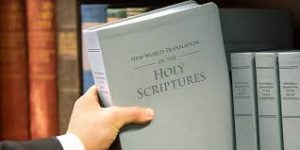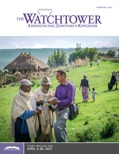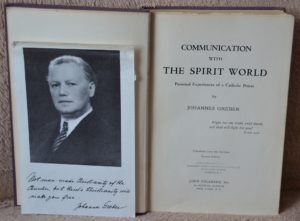
Jehovah’s Witnesses, in support of their New World Translation, make extensive use of obscure, questionable Bible translations. You won’t find them in your local Christian bookshop. You won’t find them on the shelves in a typical Jehovah’s Witness home. It is enough for them that the Society approves these translations, enough that they appear to confirm what Jehovah’s Witnesses believe. The New Testament-A New Translation and Explanation based on the Oldest Manuscripts, by Johannes Greber is a case in point.
They cited him at least nine times in their publications dating from 1956 to 1983. Some examples are:
Aid to Bible Understanding (1969), pages 1134 and 1669
Make Sure of All Things—Hold Fast to What Is Fine (1965), page 489
The Watchtower, 9/15/62, page 554
The Watchtower, 10/15/75, page 640
The Watchtower, 4/15/76, page 231
The Word—Who Is He? According to John (1962), page 5
Yet The Watchtower of February 15, 1956, contains nearly a full page devoted to warning readers against Johannes Greber and his translation. It refers to his book titled Communication with the Spirit-World: Its Laws and Its Purpose and states, “Very plainly the spirits in which ex-priest Greber believes helped him in his translation” (The Watchtower, 2/15/56, p. 111).
Greber was popular with Jehovah’s Witnesses for many years because his Bible supported their translation of John 1:1, ‘…and the Word was [a] god.’ As recently as Summer 2016 an inquiry to our offices saw Greber appealed to again in a copy of The Word-Who is He? According to John (1962).
Why would Jehovah’s Witnesses persist in putting this forward as an argument for their reading of John 1:1? It doesn’t help the typical Witness that the Society itself misleadingly cited this ‘translation’ up until 1983. Further, there is so much redundant Watchtower material out there and a Jehovah’s Witness will regard any publication under the banner ‘Watchtower Society’ as authoritative.
Johannes Greber
Johannes Greber was born in Wenigerath, Germany, and was ordained a Catholic priest. The whole course of his life changed in 1923 when he attended a séance. Renouncing his vows, he left the Catholic church and, in 1929, emigrated to the USA. It was in New York that he began prayer and healing sessions. He later produced and published The New Testament, A New Translation and Explanation Based on the Oldest Manuscripts (1937).
But this was no ordinary scholarly work. Greber claimed that he translated with his wife acting as a medium. This authority Jehovah’s Witnesses use claimed that, where there was doubt, or in he absence of original sources, he happily used the text given by the spirits. While the claim is that this translation is ‘based on the oldest manuscripts,’ this is patently not true. Jehovah’s Witnesses, in using Greber, are being led by spirit guides.
It was only after ex-Witnesses drew attention to the fact that Greber was a spiritualist that The Watchtower of April 1st 1983 published the following:
“This translation was used occasionally in support of renderings of Matthew 27:52, 53 and John 1:1, as given in the New World Translation and other authoritative Bible versions. But as indicated in a foreword to the 1980 edition of The New Testament by Johannes Greber, this translator relied on “God’s Spirit World” to clarify for him how he should translate difficult passages. It is stated: “His wife, a medium of God’s Spirit world was often instrumental in conveying the correct answers from God’s Messengers to Pastor Greber.” The Watchtower has deemed it improper to make use of a translation that has such a close rapport with spiritism. (Deuteronomy 18:10–12) The scholarship that forms the basis for the rendering of the above-cited texts in the New World Translation is sound and for this reason does not depend at all on Greber’s translation for authority. Nothing is lost, therefore, by ceasing to use his New Testament.”
This makes it look as though they have just discovered his background and decided to drop him. However, as we have seen, the Watchtower Society had known about Greber’s spiritualism as far back as 1956.
In ‘The Word, Who is He’ (1962) they introduce Greber’s translation thus: ‘Similar is the reading by a former Roman Catholic priest.’ Given the unrelenting attacks the Society makes on the Roman Catholic Church, one might infer that they are celebrating a disaffected priest who has come to disavow his faith because of a Bible translation. The truth is he gave up his calling because he attended a seance and became convinced of spiritualism. Its not what you say, its the way that you say it – as well, of course, as what you fail to mention.
Emphatic Diaglott:
A favourite translation is this by Benjamin Wilson. He is described by commentators as an autodidactic Bible scholar. In other words, self-taught and bringing to the task of Bible translation no formal qualifications; rather like the translators of the NWT. Wilson, starting out as a Baptist, became an Adventist, joining with the Cambellites for a while, then becoming a Christadelphian. He denied completely the pre-mortal existence of Jesus, his deity, and the whole doctrine of incarnation. Is it any wonder he would agree with Jehovah’s Witnesses?
James Moffat
Many translations they cite are the efforts of individuals, such as James Moffatt, who regarded miracles and the resurrection story as myth.This is from the Bible Research site:
“Moffatt produced his translation of the New Testament while he was serving as Professor of Greek and New Testament Exegesis at Oxford, and its reception was so favorable (in the more liberal churches) that he undertook the Old Testament in order to produce a complete Bible. The version is highly colloquial, and allows the reader to quickly follow the progress of thought in many passages (especially in the Epistles) where a more literal rendering makes for difficult going.
But Moffatt’s version was controversial in several respects. His preface put forth skeptical views concerning the truthfulness of the Bible. In the Old Testament he indicated by the use of different type fonts the hypothetical source documents of the Pentateuch (J, E, P, D), and frequently rearranged passages according to his idea of how they might have originally stood. For the New Testament he used the Greek text of Hermann von Soden, which was generally regarded as an eccentric text, and he often substituted conjectural emendations for the text of both Testaments.
In the New Testament alone he adopts some thirty conjectures unsupported by any manuscripts. The translation throughout was highly readable, but often embodied interpretations that were objectionable to some. Roman Catholics and Lutherans were especially offended with Matthew 26:26, “Take and eat this, it means my body.” Moffatt later served as executive secretary of the committee of translators for the Revised Standard Version.”
The most reliable translations are the product of a team of scholars, accountable to each other and subject to peer review. The NWT was produced by a team but it is telling that, under the guise of humility, the translators remain anonymous. We have no way of checking whether they are qualified, and know nothing of the translation process. We do know that the original translators of their first edition hadn’t a qualification between them.
The question here is very simple. Is it wise to trust such people? Of course, many Jehovah’s Witnesses have no experience of the Bible outside the Society. They have nothing with which to compare their experiences, and assume they are well fed by the organisation. The Society maintains this status quo by forbidding them to accept ‘apostate literature’ and charging them to avoid ‘wrong associations.’ It is tragic that a wealth of information and understanding is out there but denied them by a society that treats them like children.
The New Testament, In an Improved Version, Upon the Basis of Archbishop Newcome’s New translation: With a Corrected Text, London.
In support of their making John 1:1 read ‘…and the Word was [a] god.’ they cite, among others, The New Testament, In an Improved Version, Upon the Basis of Archbishop Newcome’s New translation: With a Corrected Text, London.
This certainly looks authoritative, an Archbishop no less, and ‘An Improved Version’ too. What they don’t make clear is that Archbishop Newcome’s translation was published in 1800, the year of his death, but this text is dated 1808. The clue is in the words ‘A Corrected Text.’ They are, in fact, not citing the much misused Archbishop, who did not render John 1:1 ‘…a god’ in his original work. What they cite is a Unitarian translation by Thomas Belsham, based (very loosely based) on the Archbishop’s text. Newcome’s brother-in-law, Joseph Stock, bishop of Killala in Achonry, County Mayo, issued an indignant response to this abuse of the Archbishop’s translation.
Of course, Unitarians will agree with Watchtower teaching because they regard Jesus as no more than a very good man. Archbishop Newcome believed no such thing.
The Goodspeed Bible
They also cite The Bible-An American Translation. One of the prime movers and translators behind this Bible was E J Goodspeed, a liberal theologian who questioned the inspiration and authority of the Bible. He seriously doubted that the gospel of John was written by a Galilean fisherman, and insisted Paul did not write Ephesians, 1 and 2 Timothy, and Titus.
Goodspeed did not consider important the idea of having an authoritative text, and rejected the idea of a canon of Scripture. For him, as for other liberals of his day, the Bible was a text to be quote-mined to construct sermons on high virtue, to inspire, to find ways to emulate the great lives of the men and women therein, especially that of Jesus. To this end, he especially pressed the idea of the New Testament in the common tongue of the time, and insisted modern Bibles should reflect this. The most important thing is general principles of thought and conduct, it would seem, and Moffatt regarded anything approaching dogma as stifling to the Christian life.
In other words, they are quoting a man they would not have on their own translation committee.
Conclusion
So much might be said about how we select evidence to support our cause. It isn’t clever to find someone who agrees with you. Unitarians are bound to agree with Jehovah’s Witnesses, as are Christadelphians, Christian Scientists, and some individual translators. It isn’t hard to find someone to agree with you on almost anything. I have a friend who denies the moon landings ever happened and I know he isn’t alone. It doesn’t make him right.
To understand the Bible, you have to read the Bible for yourself. Bible helps, commentaries, and dictionaries are, of course, invaluable, but if you don’t explore the text for yourself you will always be hostage to other people’s errors – and no one is infallible.
Interestingly, the Study Edition of the February 2017 Watchtower tells us:
‘The Governing Body is neither inspired nor infallible. Therefore, it can err in doctrinal matters or in organizational direction.’ (Point 12)
This is the same body that put the spiritualist translation of Johannes Greber into the hands of the Jehovah’s Witnesses. It is an alarming admission for people who have always been encouraged to trust the unerring leadership of the ‘faithful and discreet slave.’ Perhaps it is a signal for Jehovah’s Witnesses to consult for themselves the sources and authorities the Society relies upon, but denies ordinary members. If the Society is, after all, right, they have nothing to fear. If the Society is wrong – and fallible, uninspired people tend to be wrong occasionally – surely the sooner they know it the better.
https://reachouttrust.org/jehovahs-witnesses/revised-new-world-translation-review-by-john-tancock/


